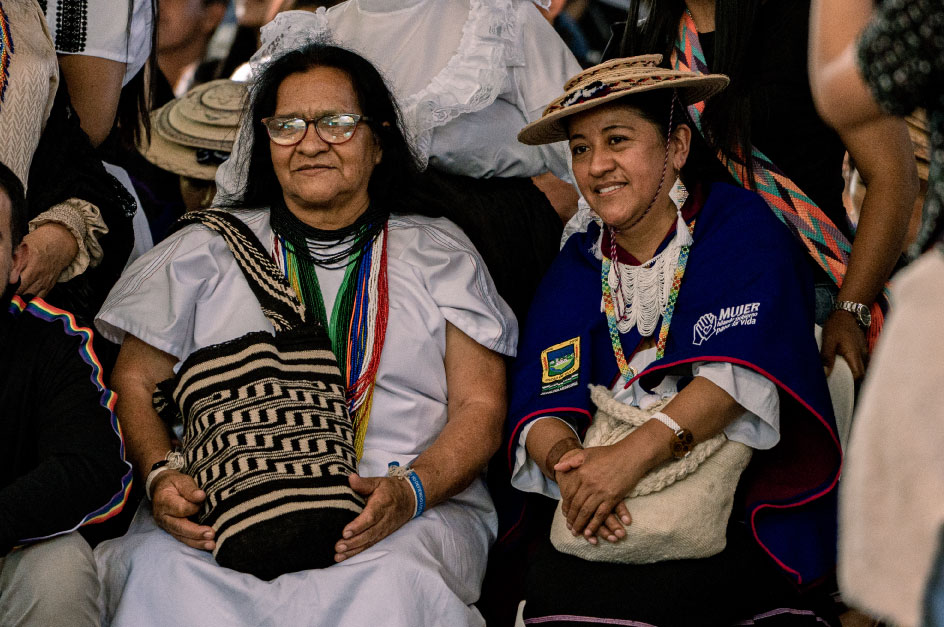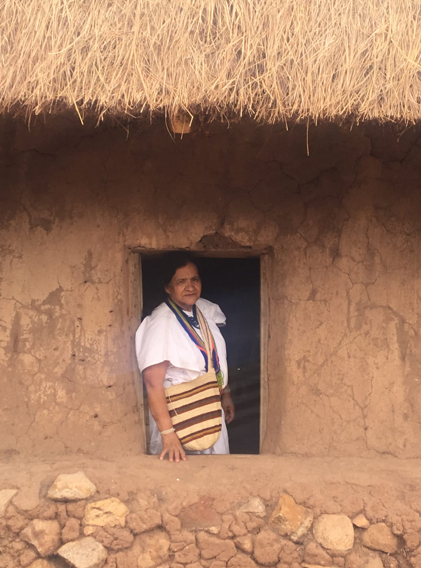The leader of the Arhuaco people will be the first Indigenous woman to hold the post of Ambassador to the United Nations. She has previously been Human Rights Commissioner for the Tayrona Indigenous Confederation and a representative of the National Commission of Indigenous Peoples of Colombia. She has received several international awards, including the “Anna Lindh” Human Rights Award (2007) and the “Antonio Nariño” Award from the French and German embassies (2019).
The leader of the Arhuaco people will be the first Indigenous woman to hold the post of Ambassador to the United Nations. She has previously been Human Rights Commissioner for the Tayrona Indigenous Confederation and a representative of the National Commission of Indigenous Peoples of Colombia. She has received several international awards, including the “Anna Lindh” Human Rights Award (2007) and the “Antonio Nariño” Award from the French and German embassies (2019).
Indigenous Debates: What does your recent appointment as Ambassador to the United Nations mean for Colombia?
Leonor Zalabata Torres: It will certainly be a huge experience, but I don't know if it will really represent any significant change. Community interests, collective interests and the search for a peaceful solution to our problems have always formed the basis of Indigenous Peoples’ political identity, and I don’t believe this identity will be lost by my taking this step that has been entrusted to me. I understand it as an appointment aimed at countering social exclusion and racial discrimination. It is an opportunity that I am taking with the hope of doing it well. This country needs all of us to participate and work to ensure that the international community embraces our national proposals.
ID: How do you envisage your role as the Colombian State’s representative before the United Nations given your dual status of Indigenous person and Colombian citizen?
LZT: I am not going to be an ambassador for Indigenous Peoples alone. Colombia’s Permanent Mission to the United Nations is a brilliant opportunity for all Colombians to show the world what we really are: a multicultural country with a strong identity. We comprise 115 Indigenous Peoples plus the Afro and Raizal peoples of San Andrés and Providencia; a country in which we speak 68 different languages. I am confident that President Gustavo Petro’s intention is to promote a Colombia that will make a contribution to humankind. We have to represent everyone without distinction: Indigenous Peoples, Afro-Colombians, those of us who live in the mountains, the forests, on the plains and in the cities. We must seek a better life, a life of peace. Our representation at the United Nations must act in the best interests of all.
ID: Some people have been critical of your appointment, even condemning your inability to speak English. What do you think of this?
LZT: I would simply ask how many of these people speak any of the Indigenous languages of our country! It’s true, I don’t speak English, but I don’t see why this is a problem because Spanish is one of the official languages of the United Nations. These comments merely demonstrate their ignorance of how the world works. But there’s more to it than this, I think. Let them investigate us and they will see, for example, that we have not been involved in this country's history of corruption. We have not participated in the exclusion of others from our political system. To be inclusive, you need to have a capacity and honesty that comes from the experience of our peoples.

Leonor Zalabata with Mama Mercedes Tunubala Velazco of the Misak people, mayor of the municipality of Silvia Cauca and host of the Summit. Photo: Leonardo Díaz Ramírez

Leonor Zalabata with Mama Mercedes Tunubala Velazco of the Misak people, mayor of the municipality of Silvia Cauca and host of the Summit. Photo: Leonardo Díaz Ramírez
ID: What do you hope to do, at the United Nations, to put a stop to the murders of social leaders and to ensure that work is resumed to comply with the Peace Accords?
LZT: Gustavo Petro's government has set out a number of actions that we will take. Colombia needs to end the armed conflict once and for all and build peace. This is the purpose of the Havana agreements and we must work towards this. We cannot forget the 2016 referendum, however, when many people said no to peace, and this refusal acted as a barrier to implementing the Accords. We still have to confront this resistance. The international community has played an important role in supporting the Colombian peace process and the social movements have also made great efforts, but Iván Duque’s presidency had neither the ability nor the desire to effectively implement these agreements.
ID: The process is clearly suffering from many hindrances…
LZT: As difficult as it may be, we must continue the peace process. And we Indigenous Peoples can contribute to the country through our experience. Despite being victims, we wish to find peace and solutions through dialogue. President Petro has spoken of social justice. The Peace Accords require that we put an end to criminality and impunity. I am convinced that, right across the country, and across all of Colombia’s social classes, there is a desire for peace. And yet the massacres and assassinations of social leaders, even those who have laid down their weapons, are continuing to this day. We must work to place an international spotlight on Colombia and stop this spiral of violence, which is destroying humanity.

Leonor Zalabata emphasizes the important role of the international community and social movements inside Colombia in the Colombian peace process.Photo: Alejandro Parellada

Leonor Zalabata emphasizes the important role of the international community and social movements inside Colombia in the Colombian peace process.Photo: Alejandro Parellada
ID: What priorities will the new government have, and which international bodies will be your potential allies in achieving these goals?
LZT: President Petro has been very clear on the main aspects of his programme: peace, social justice and environmental justice. These are key elements for the government and those of us who are supporting him must act in accordance with these policies. The call for national dialogue and social participation in his government will form a fundamental basis on which all Colombians, supported by friendly countries, can make progress in this dialogue. We will strive for justice and search for the disappeared through the Truth Reports. Never again do we want to see this period of our history repeated. This is why participation in the United Nations, international organisations and the Inter-American Human Rights System is essential.
ID: Polls indicate a sense of hope in the country. What is your message to those Colombians who have placed their trust in this project?
LZT: We need to grow stronger. And we need to all be on the same path, our eyes on the same future. We must come together once more and live in peace. Many of the human rights violations in Colombia are linked to environmental issues. Development projects such as mining have put many defenders at risk, killing them or forcing them into exile. But Colombia can change. This vision of development is only resulting in conflict and violence. It needs to change, although, clearly, this is not dependent on our country alone. The world has to change its vision of development. We need a dialogue of equals between the different countries. We need proposals that will allow us to coordinate our national policies with international ones because a single country cannot achieve peace in isolation.
